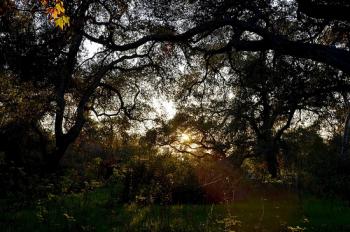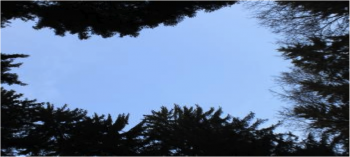Serendip is an independent site partnering with faculty at multiple colleges and universities around the world. Happy exploring!

Walk Your Own Walk
At the beginning of my walk Friday morning I started out with every intention of taking a Thoreauvian one; I started out early, turned off my cell phone, declined to caffinate, opting rather to wake up with the rest of the world. However once I got outside and began my walk I realized not only was I not ready to take a Thoreauvian walk, I didn't want to. I wanted to take my own walk, which didn't turn out to be much of a walk at all. I sat down at every possible opportuniy, but when I was sitting I ended up having my most complete and clear thoughts. Basically, a Thoreauvian walk didn't work for me, it didn't help me ruminate, and I can't "walk like a camel." However, I can sit and I can observe and I can think. While I was sitting and enjoying the surrounding nature I began to think about the concept of boundaries, real and imagined ones. I think geographical boundaries are important, and they exist for a reason, however they should not limit us, and that is where imagined, or mental, boundaries come into play. Geographical boundaries do exist, yes, but the only power they have is the power we give them. There is no limit on learning, and the boundaries of a college campus do not define an area in which knowledge can be gained. You can learn just as much in the town of Bryn Mawr as you can at Bryn Mawr College. I found the walk very enlightening and liberating, and I look forward to my next one.

The Privilege of Voice and Silence


When I first thought of images of silence that I might post last week, one thing I considered was some sort of silent protest or vigil, since activism and protesting are very important parts of my life and I love the idea of silence as a political or social act. Though I chose to go in a different direction for my picture, I was interested to see that Este put up pictures of protest, and that, contrary to what I might have done, they were clearly not silent protests. She chose to use the opposite of silence, noise, to represent silence. As I see it, the opposite of silence is represented in these images of protest not only because the activists are shouting and being not silent, but because they are heard, they have power and voice, they are expressing themselves in a way that those who are silent or silenced often do not or cannot.
Reflexions on walking
I didn't really feel any difference in my walking style while I was trying to walk like Thoreau. I think that Thoreau wants us to be thoughtful and mindful when we walk and to be curious and adventurous about what new things we might encounter, and I already do that a lot of times when I walk by myself and walk places that I am not hurrying to get to. In my essay I mostly just described some of the things that I thought about while I was walking. During part of my walk I went down senior row and I remember feeling really peaceful and wondering about Oak trees (because a lot of the trees in senior row are oaks) and how they used to be sacred to the druids that used to live in Ireland. I also visited some Beech trees and thought about them and about how people have carved their names into them. I thought about what causes people to carve their initials into trees and what this act can tell us about people and nature and the world in general. 

Boundaries, Edges, and Centers
I began my journey by walking across Senior Row, and stepping up and over the Moon Bench. Through the course of my walk, I became aware of the difference between Inner and Outer borders. To me, the moon bench is a gateway; it marks the end of the inner campus and the beginning of the outer edges. By going over it, instead of around, I felt as if I had transitioned from walking to sauntering. While I may not have had a set route or destination, I had a purpose. The entire point of the walk was that I didn’t know where I was going, because I had never been there before. I had never explored the physical boundaries of Bryn Mawr, and had absolutely no idea what I would find, or even where they were. But had I known, I would have no reason to go there. The entire point of exploration is to see what is to be discovered, regardless of whom else has seen it before. I could now call myself a saunterer in the Thoreauvian sense- I had a purpose, a mental destination. My trek transformed from one of complete aimlessness to one with a point. Had I known where I was going, that point would be mute.

I Choose to be Silent You Don't Make me be Silent

In questioning who has the power to silence whom, I often reflect on my experience based on my role within my family. I grew up in a very traditional family unit, one that maintains and defends the rules of patriarchy and reinforces the subordinate role of the women and children that exist in it. As a result of these ideals, the silencing of women has never been a foreign concept to me; on the contrary it is what has held the values of my family together. It was the silencing of my mother’s wishes to remain close to her brothers and sisters that resulted in us having to leave the Dominican Republic to pursue the economic opportunities my father wanted. It was the silencing of my aunt that led her to seek government assistance despite the fact that she had graduated from medical school because her husband was uncomfortable with the idea that his wife could be economically independent. It is my own silencing that prevents me from showing my family the opportunities I’ve taken advantage of at Bryn Mawr because they don’t believe that a woman is capable of such success.
a ranking
Hi, my name is Aliza. I didn’t get a chance to go around to these sites until this morning, and all of the inside spaces were locked or occupied, but I can imagine how I would feel in them. Here is my ranking:
1. Morris Woods
2. The campus center parking lot
3. Room 20, Park Science Building

Writing in a circle, or, Squeezing till it flows, or, How deadlines do us a favor
I found this one very hard to do. I thought it was because of the situation: I was very tired on Thursday night, had to do both the walk and the paper then, because completely booked up on Friday. Thursday had been full too, things got done, connections got made, but leaving me feeling used up and decidedly un-Thoreauvian. I felt, grumpily, that a walk under the duress of producing a peper from its ruminations could not possibly be an authentically Thoreauvian one. Once I'd written the paper I realized there were underlying emotional reasons too, which I'd been keeping well buried, and which the writing of the paper revealed to me. I think-- and hope-- that maybe this is exactly what Anne's teaching methods are trying to help us do. To discover, by writing, what we think-- AND what we feel.

A Quiet Bike Ride

I am fourteen and riding my bike back from the grocery store with a pack of colored sharpies and paperclips that I need for a science project. It’s light out, sunset at least an hour away, as I pedal down my neighborhood’s sidewalks. I pass neatly trimmed lawns that look identical, making the ride feel like an endless outdoor hall of mirrors, reflecting the same brick, two-story, white-trimmed house over and over. Despite my initial anger that my parents wouldn’t be able to give me a ride to the store because of their presence at my older brother’s awards ceremony, I’m enjoying riding my bike, the translucent grocery bag on my left handlebar shuddering and flapping in the wind, my pale skin exposed to the waning sunlight of this May afternoon. The grocery store is only a mile from my house, and I am nearing the end of my ride.
To walk like Thoreau?
Now as I think of my “Thoreauvian walk”, it was nothing like the real walk that Thoreau refers to in his essay. Actually I find it impossible for me to walk like Thoreau, to leave behind all social affairs, to say goodbye to my family and just go on for an aimless walk. Perhaps it is because we are born into a life of busyness. Since we were young we have been learning by imitating other people: we learn how to walk, how to talk or to sing all by simulating adults. It is not surprising that we also learn from them the way people keep themselves busy. We hardly ever slow the pace of life to the level of sauntering. Even when I walk just to relax, I cannot keep my mind from thinking (about the past or the future or just anything in my life). No, perhaps it is just me who has not been able to truly immerse my soul in nature, to forget everything else but the surrounding scenery. As I read about the art of sauntering, I read this quotes from John Burroughs: “To find the universal elements enough; to find the air and the water exhilarating; to be refreshed by a morning walk or an evening saunter... to be thrilled by the stars at night; to be elated over a bird's nest or a wildflower in spring - these are some of the rewards of the simple life. ” I admire the way John admires and treasures elements of nature. It feels as if John and Thoreau can really feel and live the way nature lives and exists. When we are able to “find the universal enough” or “find the air and the water exhilarating” – we become true saunterers.

Time That I've Been Silenced

I decided to write about the first situation that came to mind when the prompt was given to us. During my senior year of high school, the superintendent, Dr. Carol R. Johnson, and the rest of the Boston Public School (BPS) committee “proposed” that the best way to deal with “underperforming schools” was to simply close them down; my high school being one of the seventeen on their list. Their reasoning behind this decision or proposal was based on our MCAS scores (Massachusetts standardized tests). The main problem (and reason why I put the phrase underperforming schools in quotations) with their reasoning was that not only were the scores of a lot of these schools increasing every year, but that most, if not all, of these schools on the list were lacking the resources to even prepare their students for these tests. A lot of these schools were overpopulated and economically struggling.


